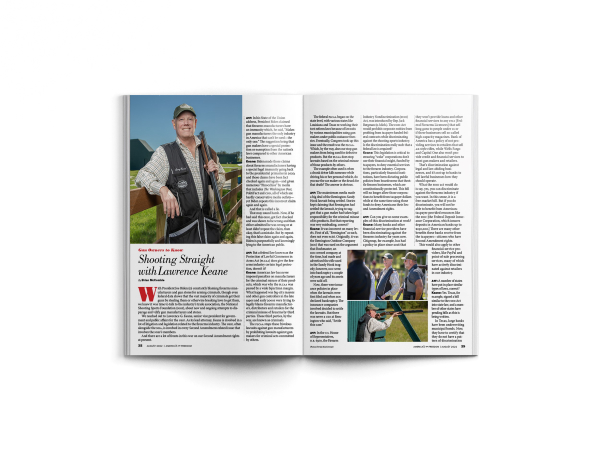The debacle over guns in the U.S. House of Representatives is a stark reminder of what is at risk when it comes to elections.
The U.S. House of Representatives held hearings and a vote that trounced on Constitutionally protected rights, ignored U.S. Supreme Court precedent and told the American public they aren’t being governed by elected officials representing “We the People.” Instead, the country is being ruled by an elite and out-of-touch governing class that’s bent on dictating “needs” over “rights.”
The House – led by Speaker Nancy Pelosi (D-Calif.) – turned their collective noses at the rights belonging to the American public and protected by the Constitution to score political points with their special-interest gun control donor class.
Last week’s power grab was kicked off by Chairwoman Carolyn Maloney (D-N.Y.) calling on firearm manufacturing CEOs from Daniel Defense and Sturm, Ruger & Co., to testify in an Oversight and Reform Committee hearing. It was a kangaroo court. A show trial. It was an attempt to name-and-shame the firearm industry for the criminal actions of others.
For those watching carefully, the Congressional circus revealed their folly. Chairwoman Maloney dangled the claim gun manufacturers made a $1 billion to put profits over people. Daniel Defense CEO Marty Daniel rejected the blame firearm manufacturers responsible for the heinous crimes committed by deranged individuals, telling the committee, “These acts are committed by murderers. The murderers are responsible.”
Sturm, Ruger & Co., CEO Chris Killoy rejected Chairwoman Maloney’s inflammatory descriptions of Modern Sporting Rifles (MSRs), saying, “I don’t consider what my company produces to be ‘weapons of war.’”
They’re both right. The companies produce semiautomatic rifles, technology that has existed since the late 1800’s and was commercially available in the early 1900s. These rifles operate the same way as popular duck-hunting shotguns and self-defense handguns.
Lawmakers never alleged an actual crime by the firearm manufacturers. Nor did they blame the criminals committing the crimes. The hearing was a made-for-television production designed to boost Chairwoman Maloney’s profile as she heads into an August Democratic primary against Rep. Jerrold Nadler (D-N.Y.). The two are facing off against one another in for the same Congressional seat after their respective Congressional districts were merged.
Chairwoman Maloney’s gun control hearing, and the Assault Weapons Ban of 2022, passed by Chairman Nadler from his House Judiciary Committee and by the House in a 217—213 vote, was nothing less than political chest-thumping to their New York gun control base. They would snatch Constitutionally protected rights from law-abiding Americans to outdo one another in their increasingly desperate attempt to cling to power.
Chairman Nadler is no better. He admitted during the mark-up for H.R. 1808, the bill to ban MSRs and some semiautomatic shotguns and handguns, that he knew the legislation was unconstitutional and defied the rulings by the U.S. Supreme Court in both Heller and Bruen.
Heller held that firearms in common use by the American public are protected. NSSF released the most recent MSR production figures that show there are more than 24.4 million MSRs in circulation between 1990 and 2020. That doesn’t include what’s been produced in 2021 and so far in 2022, nor those made from 1963 – when they entered the commercial market – and 1990. That dwarfs the estimates of Ford F-Series pick-up trucks on the road, which number just 16.1 million in comparison.
Justice Clarence Thomas wrote in the Bruen decision, that, “…the government must demonstrate that the regulation is consistent with this Nation’s historical tradition of firearm regulation.”
The Bruen decision further held that modern arms are analogous to those arms in existence at the time the Second Amendment was ratified.
For Congressman Nadler, history, tradition, the Constitution and the Supreme Court be damned. He, and the other 217 Members of Congress that voted for this ban couldn’t be bothered with the rights of “the People.” He needed to “one-up” Rep. Maloney on his gun control credentials. Her points were already scored. She wasn’t even there for the final vote on the bill instead, she attended a political fundraiser.
This legislation has no chance in the U.S. Senate. That doesn’t mean these attacks on the firearm industry or gun rights will end. That’s why it is imperative for all who value freedom and their Constitutional rights to learn the issue, register to vote and show up on Nov. 8 to #GUNVOTE. Don’t risk your rights.
— Lawrence G. Keane
Lawrence G. Keane is the Senior Vice President and General Counsel for NSSF, the firearm industry trade association.






